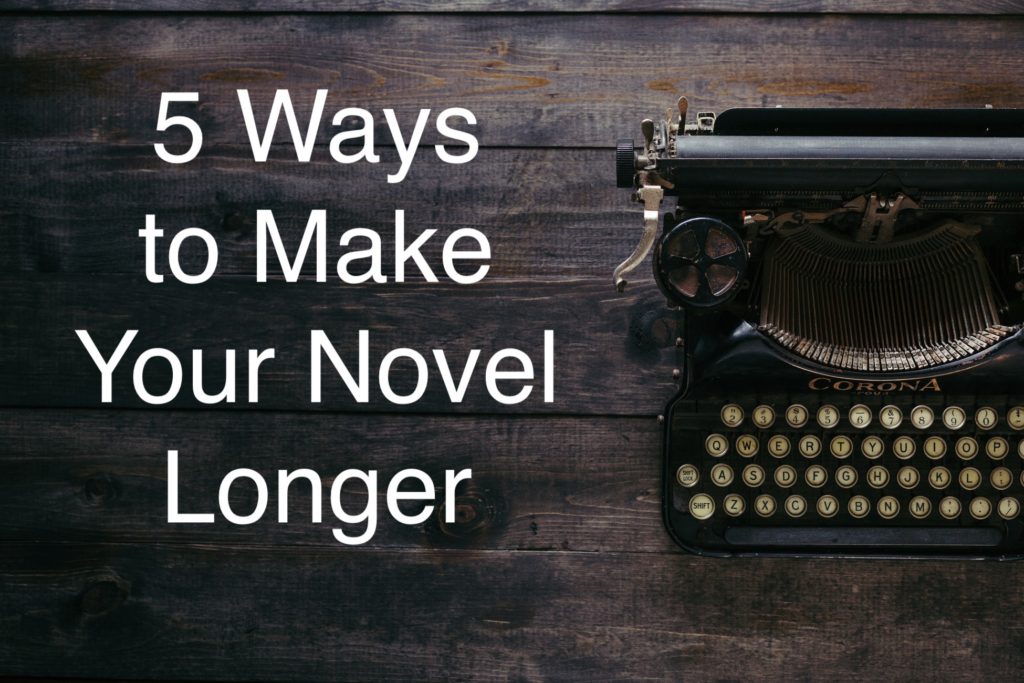Looking for ways to make your novel longer? Maybe you’re stuck in the novella range and want to increase the word count to reach novel length?
If that’s the case, you’ve come to the right place! Below, I’ve outlined five techniques you can use to lengthen your story without sacrificing quality.
Five Ways to Make Your Novel Longer
You might want your novel to be longer. But I prefer to keep this blog post as short as possible, while delivering the goods. So let’s jump right in. Here are five ways to increase word count and make your novel longer, better, and more complex.

1. Add more characters to the story.
Adding characters to a story can make it longer and more interesting at the same time. Every good novel has a protagonist or main character, at least, and most have an antagonist as well.
But why not go beyond the basics by introducing additional characters? If you do this, you could end up with a richer and more complex story.
Your protagonist should be the most interesting character in your novel. He or she should also get the most “screen time.” But there’s nothing stopping you from introducing secondary characters within your story.
Here are some other character types you might consider using:
Deuteragonist: The deuteragonist is the second most important character in a story. (In Greek, the word literally means “actor of second importance.”) This is the sidekick or best friend. They serve as a close confidant for the protagonist and help them on their journey. Examples of deuteragonists include Hermione Granger in Harry Potter and Samwise Gamgee in The Lord of the Rings.
Tertiary characters: These “third level” supporting characters play a less important role in the story than the protagonist, deuteragonist, or antagonist. They might still be important to the plot, but they’re not as central to the story as the other characters. Examples include Mrs. Weasley in Harry Potter, Gandalf in The Lord of the Rings, and Miss Havisham in Great Expectations.
Foil character: A foil character contrasts with the protagonist in order to highlight their strengths and weaknesses. They often have opposite personalities or beliefs, and they can help the protagonist to grow and learn. Examples of foil characters include Draco Malfoy in Harry Potter, Feyd-Rautha Harkonnen in Dune, and Heathcliff in Wuthering Heights.
Mentor character: A mentor provides guidance and support to the protagonist. They often have more experience or knowledge than the protagonist, and they can help them to overcome obstacles and achieve their goals. Examples include Albus Dumbledore in Harry Potter, Obi-Wan Kenobi in Star Wars, and Haymitch Abernathy from The Hunger Games.
Love interest: A love interest is romantically involved with the protagonist. They can be a major character in the story, or a minor one who only appears occasionally. Love interests often give the protagonist emotional support, but they might also steer them in the wrong direction (inadvertently). Examples include Daisy Buchanan in The Great Gatsby and Edward Cullen in the Twilight series.
Additional characters can also complicate a story, and in a good way. They can challenge your protagonist during her journey. Complications heighten the drama and keep readers turning pages. You can accomplish all of these things just by adding characters.
2. Prolong the buildup before your climax.
Most novels have some form of rising action that leads to a climactic moment. The story begins. Complications arise. The action intensifies and ultimately leads to a climax, followed by a resolution. That’s the basic structure for almost all fiction and drama.

If you want to increase your word count and make your novel longer, consider stretching out the buildup that precedes the climax. The idea here is not to add unnecessary fluff to the story, but purposeful scenes and chapters that sweep the reader forward.
So, how do you accomplish this? How do you lengthen the buildup that comes before your novel’s climax? One way is to add problems to the story. So let’s talk about that next.
3. Add challenges, complications and hurdles.
Have you read The Martian, by Andy Weir? Or seen the movie version? (If not, don’t worry … this example still works.) That story is basically a series of problems and complications told in sequential format.
Andy Weir originally serialized the novel online, allowing people to provide feedback along the way. He made his novel longer just by adding more problems for his protagonist, astronaut Mark Watney. Watney solves one problem only to encounter another, even thornier one. And thus the story moves forward.
You can use this same technique to increase your word count and make your novel longer. This also makes your story more engaging for readers.
Conflict and complication form the backbone of any good story. The protagonist has an objective, something he or she is striving for. But it’s not going to be easy. It can’t be easy. Your protagonist has to struggle, overcoming a series of obstacles and hurdles to reach the objective. It reveals character.
Complications make fiction more dramatic and engrossing. They can also help you increase your word count for a longer novel. Want more pages or chapters? Just introduce more problems.
4. Extend the timeline of your novel.
This strategy overlaps with some of the ones we’ve already covered. By extending the timeline during which the story takes place, you’re creating space for additional characters, complications and events. You’re also increasing the word count and making your novel longer.
Does your story take place within one week of the character’s life? Bump it out to six weeks or several months. One of the reasons why “epic” novels are so long is that they unfold over a period of years, in many cases.
5. Explore your characters’ backstories.
Have you ever read a novel where the main character felt “flat” or one-dimensional? More often than not, this results from a weak or nonexistent backstory.
In this context, the “backstory” refers to the events that take place before the actual story. It includes the protagonist’s background and history.
You can incorporate this kind of material through flashback, dialogue or narrative. It makes your characters well-rounded and complex. It also helps increase the world count for a longer novel.
I tend to include a lot of backstory in my books. (Some people might say too much, but that’s all subjective.) It’s a balancing act. As a writer, you want to develop your characters’ histories in order to bring them to life. But you don’t want to overwhelm the reader or pull them out of the storyline for too long. Beware, the info dump!
So where does this backstory come from? It comes from you, the writer. It comes from your imagination. But the reader must feel like it comes from the characters themselves. The backstory shapes the characters and influences their actions, decisions and desires.
One way to develop backstories is by using character journals or diaries. This process is simple but powerful. All you do is write a few journal or diary entries in the POV / voice of your character. Nobody sees them. You keep them private, just like a real diary. You can turn off your internal editor and let the words and thoughts flow.
You’d be surprised at how liberating this process can be. It can help you discover new thoughts, fears or desires within your characters. It makes the novel longer and the characters more engaging. Bonus!
Learn more: Here are some more tips for creating backstory, from the NY Book Editors blog.
Putting Substance Over Fluff
All of these techniques have something in common. They’ll make your novel longer — by adding time, people or events — but they’ll also make it better.
You’re not just adding “fluff” to the story. You’re not padding it with weak or trivial information. You are making smart, strategic choices that will result in a longer and stronger story.
Share your thoughts! Do you have suggestions for writers who want to increase their word count without sacrificing quality? I’d love to hear them. Feel free to share by dropping a comment in the box below.

Ylaine Genovate Tanagon
As a beginner, this feed helped me to write my story. I don’t want to make my story hardcore detail but important ones